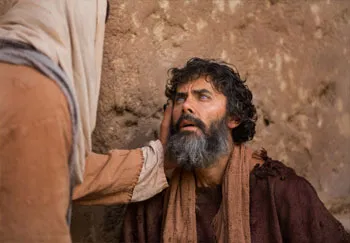Blind Bartimaeus‘ encounter with Jesus is one of the most moving in the Gospels. Also known as the blind man of Jericho, he demonstrates great faith and perseverance by continuing to cry out, even when the crowd told him to “shut up”.
The most moving thing is the attitude of Jesus Christ. He stops and heals Bartimaeus. Why? What did he do to get the Lord’s attention so much? It wasn’t just the screams. There was a lot of noise there.
- Who was blind Bartimaeus in the Bible?
- What did the blind man from Jericho do to stand out? Read this study to find out more about the great man of Jericho.
Who was blind Bartimaeus?
As the text shows, he was the son of Timaeus, and the name Bartimaeus comes from the combination of the suffix BAR which means ‘ son of ‘.
It is said that Timaeus was a General who served Israel in the Bethel detachment and that when he retired he became a successful man in the region.
When the dominion of the Roman Empire took place, their assets were confiscated, and their retirement pay was cut.
He became a rebel. He led several seditions that moved in the direction of destabilizing Roman rule in the region.
Identified by the Roman Empire as a person dangerous to their goals, Timaeus was persecuted, arrested, and crucified to death because of his seditions.
After the death of his father, Bartimaeus was ordered to gouge out his eyes to prevent him from becoming an even more dangerous rebel than his father was.
What about Bartimaeus?
A shabby cover and a friend who is also blind, a professional colleague. Two beggars. In that place, Bartimaeus was very well known.
It was the point that was begging. I imagine how painful the life of a blind man, a beggar, must be. We are discriminated against for our shortcomings.
Bartimaeus’ spiritual eyes saw Christ
At that time, it was common for the crucifixion of a large number of people to harm the order and government of the oppressive empire.
As it was also common to eliminate male children or make them disabled so that they would not follow the example of their parents.
So much the better if they were left alive with a disability because they would be a real walking billboard warning “Don’t follow the example of Timaeus. Look what happened to him and his son .”
Finally, now that you know a little better who blind Bartimaeus was , let’s see why he was healed.
He wasn’t upset about the situation.
We know that children inherit nature and take the pain of their parents. He had every possible potential to become a bitter rebel.
His father wanted to win the empire alone and was sacrificed for this. Timaeus did not know how to wait for the right time and the right way for things to happen. He destroyed his life and complicated that of his entire family.
Bartimaeus was paying for a mistake that was not his. Like Joseph, who inexperienced was paying a huge price for having told what God gave his heart to his father.
The conversation reached the ears of the brothers and the saga of their suffering began.
Bartimaeus was paying a high price for his father’s mistakes, but there is no evidence that he lived whimpering in the four corners of Jerusalem, there is no evidence that he rebelled against God as many do when life doesn’t seem fair to him.
Bartimaeus decided to fight. He couldn’t do much, but the little he could, he did.
To support his family, the only resource he had left was begging, but he did this regularly and efficiently.
Psalm 34:4-6 says, “ The day I started to get depressed, I sought the Lord, and he delivered me from all my fears. The Lord heard this poor man, he delivered me from all my troubles ”.
I like the word ALL. God did not deliver from some, from several, or from one. God delivered them all. Hallelujah! There was blind Bartimaeus, shouting and crying too.
He didn’t isolate
When facing crises, many isolate themselves from friends and society, shutting themselves away from the monastery of commiseration and self-pity. Those with problems tend to isolate themselves.
Those who suffer from a disability feel discriminated against by life and inevitably fall into depression.
This man was different, he called another disabled person and under his influence, they were both there the day Jesus passed.
Jesus taught us a beautiful principle about unity in suffering: ” Where two or three gather in my name, there I will be in their midst” ( Math 18. 20 ).
My brother, the fight is fierce, the battle is cruel, call other people to be with you. Start crying together, Jesus will appear and the miracle will happen.
This is not a cliché, it is a Biblical standard for the Christian. Daniel found himself in trouble, so he called Hananiah, Misael, and Azarias to pray ( Dn 2. 16-19 ).
Jesus, when he saw himself in trouble, did not isolate himself, he called his disciples to pray with him. Jesus took them with him to increase the chorus of the cry.
He didn’t care if his case was worse than his friend’s
His friend was also blind, but at least he still had his eyeballs. Your most difficult situation could affect your faith.
But Bartimaeus somehow seemed to understand that the harder the problem is the better for God.
Nebuchadnezzar in trouble calls Daniel: “Daniel, prince of God, I know that an excellent spirit is in you, the spirit of the Gods, and that nothing is difficult for you.” Dn 4. 4,5,8-9.
Paul taught us, “ I can do all things through Christ who strengthens me ”. Fp 4.13.
7 Lessons to Learn from Blind Bartimaeus
The healing of Bartimaeus (Mark 10:46-52) stands out among other healing stories in the gospels. The event is unique because the beggar’s name is known, but also because Jesus praises Bartimaeus for his faith. This indicates that there was something about how Bartimaeus interacted with Jesus that is instructive to us. Bartimaeus illustrates how we can draw closer to Jesus, particularly in times when we are seeking our own healing. If we are to emulate the faith of Bartimaeus, there are seven steps to keep in mind. below are the 7 Things We Can Learn From Blind Bartimaeus

1. Recognize that Jesus is near
Not much is known about Bartimaeus beyond his blindness. He would sit by the gate of the city of Jericho and beg. As someone with a physical illness, this was the only source of support available to him.
He was deprived of all worship in the Temple; he was exercised from the city; he was considered cursed by God. However, his life is transformed when he recognizes the closeness of Jesus. Jesus approaches and Bartimaeus responds.
There may be times when we feel cut off from God’s presence. We may feel unloved or discarded. However, like Bartimaeus, Jesus walks beside us. Jesus does not distance himself from our pain or need.
This passage presents the glorious truth that no matter what we feel or what we may struggle with, Jesus is near.
2 . Shout out in faith
Bartimaeus recognizes the closeness of Jesus and calls him. He begins to shout: “Jesus, Son of David, have mercy on me” (v. 47). His words are intriguing.
Although the crowd tells Bartimaeus that “Jesus of Nazareth” is passing by, Bartimaeus refers to Jesus as the “Son of David.” “Jesus of Nazareth” is a human designation that refers to the physical life of Jesus.
“Son of David,” on the other hand, is a messianic title. Bartimaeus believes that Jesus is the long-awaited descendant of David, the one who will sit on David’s throne for eternity.
Bartimaeus did not have all the answers. However, he was faithful enough to believe that Jesus had the ability and the will to transform his life. By that faith, Bartimaeus called Jesus. What would it be like for you to do the same?
3. Push through the obstacles
Bartimaeus’ cries are initially met with reproach. The crowds around him communicate that he is being a nuisance and that Jesus has more important things to do than answer to some insignificant beggar.
Bartimaeus, however, is not intimidated. Although reprimanded and silenced, Bartimaeus continues to cry. In fact, Scripture says that he “screamed even more” (v. 48). In the presence of obstacles, Bartimaeus cries louder.
It can be easy to find reasons why we should not cry out in faith. Many of these reasons even seem pretty accurate. We might say things like “There are people worse than me” or “Jesus has more important things to worry about”.
Such statements deny the fundamental truth that you are important to Jesus. Jesus longs to be with you and interact with your life.
Therefore, any voice that tells you not to cry out to Jesus, do it. Push him. In fact, like Bartimaeus, he silences objections by shouting louder.
4. Accept the invitation
Jesus invites Bartimaeus to come forward. Jesus stops dead and says, “Call him.” In response, the people call Bartimaeus and say the word of encouragement: “Cheer up, stand up, he calls you” (v. 49).
There is a beautiful repetition in the way this is said. Jesus calls the people, asking them to call Bartimaeus, to tell him that Jesus calls him. It is as if this biblical passage hit us over the head with the truth that Jesus shouts at us.
When we hear spiritual obstacles, we feel removed from Jesus’ invitation to come closer. These obstacles are a lie. In love and grace, Jesus calls us to Himself. There is no one to whom the invitation of Christ does not apply.
Bartimaeus accepts the call; he listens to the invitation and not the obstacles. He takes off his cloak, jumps to his feet, and approaches Jesus. Where might Jesus be inviting you to draw closer to him more deeply in your life?
5. Express your need
Jesus lovingly calls Bartimaeus as he is and invites him to declare his deepest need. On one hand, we might think this is pretty obvious: Bartimaeus wants the sight of him! But by inviting Bartimaeus to express his need, Jesus is encouraging an intimate relationship.
Intimacy with Jesus occurs in the place of humility and honesty. Bartimaeus does not shy away from this intimacy but enters into it. He replies: ” Rabboni, I want to recover my sight” (v. 51).
Not only expressing his deepest longing, Bartimaeus refers to Jesus as Rabbouni — “my teacher.” Bartimaeus approaches Jesus as the only one who can provide satisfaction and healing.
Jesus invites us to express what is in our hearts and minds. You don’t have to keep anything. Whatever mercy or transformation we feel deeply in our souls, we are invited and encouraged to express these things. “What do you want me to do for you?” he asks. How could he answer him?
6. Receive the Work of Jesus
The climax of this event is when Bartimaeus is healed. The power of Jesus comes in abundance and his life is transformed. It is important to remember that Bartimaeus is not cured because he said the right words or approached Jesus in the right way.
Rather, this mercy is given because Jesus is merciful; The grace of Christ is found because he is graced. The healing of Bartimaeus illustrates the faithful love of Jesus and the fact that Jesus delights in showing his power in our lives.
We never discover the power of Jesus because we say the right words. We do not earn our healing. We experience the power of Jesus because this is who Jesus is. The truth of the Scriptures is that the grace, love, and power of Jesus are continually at work. What’s more, we are always invited to it.
When we come to Jesus and express our need, we can receive this grace because there is no reason it should be denied us. Jesus is merciful. He is in love. More than anything, he is faithful.
7. Walk with Jesus
Bartimaeus’s healing ends with a description that he “followed Jesus along the way” (v. 52). At the time Mark wrote this gospel, the Christian community was known as “followers of the way.”
Therefore, this simple phrase does not describe a walk in the same direction as Jesus. The gospel describes how Bartimaeus made the deliberate decision to align his life with the life, death, and resurrection of Jesus.
This will be the result of all our interactions with Jesus. Whether we encounter Jesus in times of suffering or hardship or find a miraculous display of healing, we are called to walk with him. We must unite our lives with his. This is the call of faith and the call of discipleship.
Bartimaeus’s healing can help us evaluate our spiritual life. Ask yourself, what step do you currently see yourself at? Or, better yet, what step might you be struggling with?
Do you need help to recognize the closeness of Jesus, or are the voices of the obstacles too loud? What would it be like for you to embrace the step you are on or move on to the next one?
We can ask those questions, not because the life of faith is like an ordered plan, but because each of these steps is a way of getting closer to Jesus.
Ultimately, this is what the healing of Bartimaeus is all about. It is a story about the power of Jesus being experienced in one person’s life. This can also be your story.


Hello. Please could you provide the source for the story you have told about Timaeus, father of Bartimaeus?
I could not find it elsewhere.
Thank you